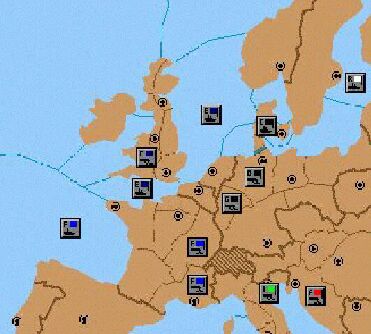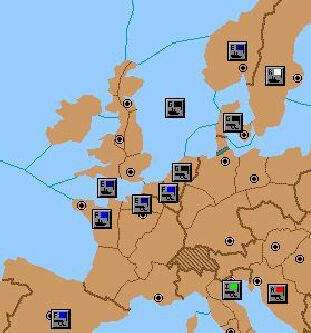

The Bismarck Opening
Theo Kermanidis
Okay, so you have drawn Germany and it is Spring 1901. What do you do? Being a central power your choices are plentiful. Do you:
- Suicidally attack Russia solo (been there, done that)
- Go Sealion hunting with France (been there too)
- Feast on French Fries with England (yup, there as well)
- Why not visit cousin Franz in Austria (haven't seen him in a while)
- Holiday in sunny Italy (those Italian roadways are murder)
- Do nothing and stay home (the beer is good).
Here is a twist of an idea to add a touch of garnish to your favourite beverage:
"BREAK THE ENGLISH BLOCKADE BY F1901M"
Nutty, yes� and the diplomacy is very challenging, but remember we have tried just about everything else. All the dogma we have read about Germany (being a central power, easily attacked from all quarters, must continually communicate with all powers even while wiping the blood from your last victim after a fresh stab) does require a lot of consideration. But we are beyond that now.
Here is what you do� Read on.
Spring 1901
Negotiate! Negotiate! Negotiate!
What you want is the following to happen:
The Recipe
- An English/German agreement to attack France.
- Russia to not move A Mos - StP (ie concentrate on a southerly campaign).
- An agreement between England/Russia and Germany to equitably divide Scandinavia.
- An English/French DMZ in the English Channel.
- Germany and Russia to agree a DMZ in Prussia and Silisea.
- A Germany and France non-aggression pact.
- No Russian/French alliance.
The Method
- Get England to open anti-French (F Lon - Eng, F Edi - Nth, A Lpl - Wal)
- Get Russia to open F StP - GOB (A Mos - Ukr)
- Get a non-threatening French opening (eg. F Bre - MAO, A Par - Bur, A Mar S A Par - Bur).
- You open with A Mun - Ruh, A Ber - Kie, F Kie - Den
Spring 1901
 |
|---|
"What?" you exclaim. "What is so special about this? It smells of a Blitzkrieg. Every other German opening is like that." Well in truth, yes! The secret ingredient is in the Fall turn.
Fall 1901
By now, France will be barking foul! "English treachery! Down with the Halls of Westminster," or something similar. Your job is to negotiate! negotiate! negotiate!
England wants to get her army onto the continent, and in addition would like to pick up a build. England has a safe build in Norway. Risky builds in Belgium and Brest. Russia would like to enter Sweden. France would be begging for an alliance.
What you want is the following to happen:
The Recipe
- A French/German anti-English alliance.
- A German/Russian non-aggression pact.
- England to convoy to Picardy.
- England to pick up a build in Norway.
- No Russian/French alliance.
The Method
- Get England to move A Wal - ENG - Pic and F Nth - Nwy
- Get France to move A Bur - Bel, F MAO - Bre, A Mar - Spa
- Get Russia to move F GOB - Swe
- You move A Ruh - Hol, A Kie - Den, F Den - Nth
Fall 1901
 |
|---|
Viola! Here is the foundation of the Bismarck Opening. What does it mean?
Just like its historical counterpart, the English are faced with a dilemma. Does England expend much energy hunting down the lone German fleet in the North Sea?
This opening presents possibilities that most other openings lack.
- Breaks the English blockade early on, and provides Germany with a chance to get a fleet into the open (eg. NWG or NAO).
- Provide convoy opportunities to the British mainland and first dibs at English home SC's.
- Temporarily isolates the English army on the continent reducing England's defensive ability.
- Provides Germany with two builds which is generally acceptable to most neighbours (probably except England in this case), 3 builds tend to raise suspicions.
- Ensures a less hostile France, potentially a strong ally, since England is the main threat.
- Buys some friendly time with Russia for allowing the build in Sweden.
Okay, what are some of the disadvantages of this opening.
- If you lose your nerve, or none of the above happens in 1901, then all bets are probably off regarding this opening. This opening then may revert to the more familiar Blitzkrieg Opening (Denmark Variation) with F Den H (- Swe), A Kie - Hol, and A Ruh S A Kie - Hol (- Bel) or the Anschluss Opening (A Ruh - Mun).
- There is a potential for an isolated German fleet. This is not necessarily a bad thing for Germany and more of nuisance value to England. Remember the Bismarck!!
- An army in Denmark does have some limitations.
Some of the potential diplomacy issues that need to be considered are as follows.
- What is Germany's intent with a fleet in the north? What do you tell Russia? What do you tell France? More specifically what do you tell England?
- Should Germany become self absorbed and successfully take English home SCs without any French gains. Is this a bad thing? How will France react? How will Russia react?
- How do you prevent England and Russia from allying against you?
- What does Germany build?
Your prospects in Spring 1902 suddenly seem a lot more challenging. Are you up to it? Well the ball is in your court. Which way will it bounce?

|
Theo Kermanidis
(theok@eisa.net.au)
|
If you wish to e-mail feedback on this article to the author, and clicking
on the envelope above does not work for you, feel free to use the
"Dear DP..." mail interface.









